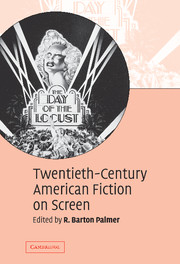Book contents
- Frontmatter
- Contents
- List of illustrations
- Notes on contributors
- Acknowledgments
- Introduction
- 1 Filming an unfinished novel: The Last Tycoon
- 2 The texts behind The Killers
- 3 The Day of the Locust: 1939 and 1975
- 4 Ship of Fools: from novel to film
- 5 Intruder in the Dust and the southern community
- 6 Dramatizing The Member of the Wedding
- 7 Film and narration: two versions of Lolita
- 8 World War II through the lens of Vietnam: adapting Slaughterhouse-Five to film
- 9 John Huston's Wise Blood
- 10 Genre and authorship in David Cronenberg's Naked Lunch
- 11 Screening Raymond Carver: Robert Altman's Short Cuts
- 12 The Color Purple: translating the African-American novel for Hollywood
- 13 The specter of history: filming memory in Beloved
- 14 Filming the spiritual landscape of James Jones's The Thin Red Line
- Filmography
- Index
- References
2 - The texts behind The Killers
Published online by Cambridge University Press: 12 January 2010
- Frontmatter
- Contents
- List of illustrations
- Notes on contributors
- Acknowledgments
- Introduction
- 1 Filming an unfinished novel: The Last Tycoon
- 2 The texts behind The Killers
- 3 The Day of the Locust: 1939 and 1975
- 4 Ship of Fools: from novel to film
- 5 Intruder in the Dust and the southern community
- 6 Dramatizing The Member of the Wedding
- 7 Film and narration: two versions of Lolita
- 8 World War II through the lens of Vietnam: adapting Slaughterhouse-Five to film
- 9 John Huston's Wise Blood
- 10 Genre and authorship in David Cronenberg's Naked Lunch
- 11 Screening Raymond Carver: Robert Altman's Short Cuts
- 12 The Color Purple: translating the African-American novel for Hollywood
- 13 The specter of history: filming memory in Beloved
- 14 Filming the spiritual landscape of James Jones's The Thin Red Line
- Filmography
- Index
- References
Summary
At the risk of sounding ungracious, I should like to begin my contribution to this volume by quarreling with what I take to be the volume's founding assumptions: that modern American literature, in the form of a body of canonical texts, offers a privileged vantage point from which to analyze the intertextual relations of a series of film adaptations; that there is essentially a one-to-one correspondence between the films and what adaptation studies has agreed to call their originals; and that the obvious way to organize a volume like this one is around the common ground that the original texts rather than their adaptations share. These assumptions operate, even for those who accept them, as procedural guidelines rather than immutable articles of faith, and it is just as easy to imagine, for example, a collection of essays entitled Great Films Noirs and Their Literary Sources as one entitled Twentieth-Century American Fiction on Screen.
Since for the moment, however, imagining such a collection is all we can do, I take it that these assumptions continue in force, making adaptation study a subset of literary studies in ways that are unwisely and unnecessarily limiting. I hope to indicate some of these limits and some of the ways we might think outside them, and so expand the range of adaptation studies, by examining a few of the texts in addition to their long-acknowledged literary source, Ernest Hemingway's (1899–1961) 1927 short story “The Killers,” that inform the two films released by Universal Pictures under the title Ernest Hemingway's The Killers, the first produced in 1946 by Mark Hellinger, directed by Robert Siodmak, and starring Burt Lancaster, Ava Gardner, and Edmond O'Brien, the second, starring Lee Marvin, Angie Dickinson, and John Cassavettes, produced and directed in 1964 by Don Siegel.
- Type
- Chapter
- Information
- Twentieth-Century American Fiction on Screen , pp. 27 - 46Publisher: Cambridge University PressPrint publication year: 2007



